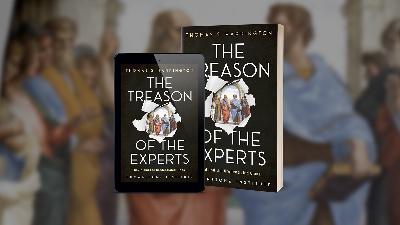The Spirit of Time
Update: 2025-10-11
Description
By Jeffrey A. Tucker at Brownstone dot org.
[The following is an excerpt from Jeffrey Tucker's book, Spirits of America: On the Semiquincentennial.]
Sloane's eighth chapter begins with an interesting observation. He was an expert on old-style covered wooden bridges. Strange passion but stick with me here.
He observed that there were always signs on these bridges: "Walk your horse." Apparently galloping across a bridge creates a rhythmic pattern that weakens the structural foundations. To make the bridge secure for longer, people on horses dismounted and walked slowly and deliberately.
He uses this to illustrate a fascinating point about the American perceptions of time in the past. It was really never about haste. The idea of a "New York minute" is new. The old way is patience, discipline, slow achievement, and unrelenting and constant work in all hours.
Sloane points out that if you ever visited an older farmer and see how he works, he is rather slow about it all but never stops going. He does this and does that but never seems to be in a rush. He seeks to do a thorough job, not a quick one. He doesn't get frustrated with the wood that doesn't fit, the nail that is rusted, or the door jam that is off; instead, he just calmly takes it on as another thing to do.
I vaguely recall this as a young man when I worked with my uncle on a roofing job. We climbed up carefully and slowly and started pulling shingles one by one, fixing or replacing them, and moving on to the next one. I quickly grew impatient as I saw the huge length we had to cover. I started to rush my portion and brag about it. He looked at me knowingly.
We worked for hours in the hot sun. Finally, at nearly the noon hour, he said we should take a break. I was deeply grateful, climbed down the ladder, and headed for the water hose. I drank as much and as fast as I could. He muttered a warning about that. Sure enough, I threw up. Blech. He laughed and we went inside.
He sat down and his wife bought him not a gigantic glass of water but a cup of coffee. I sat there gobsmacked. How in the world could he have coffee after 4 hours in the hot sun with nonstop work? Years later, I was still thinking about this.
Sloane has the answer. He didn't work fast or furiously to exhaustion. He worked slowly and deliberately, consistent with his job and his health. He knew what he was doing. I did not.
After the break and a sandwich, we climbed back up. I was intimidated by how much more there was to do. We got back at it. Another three hours went by, and we took another break. We got back up and worked more.
Sure enough, by 5 o'clock on the hour, we finished. I was thrilled and I simply could not believe how two people working steadily and deliberately could have done all that in one day. I felt great pride and still celebrate to this day.
For my uncle it was just another day, which he repeated every day on everything on which he worked.
Sloane says that this is the true American spirit. Not speed. Not haste. Not a quick win. Instead, the sense of time in our history is relentlessness, patience, deliberate, determined, steady, disciplined. Routine not dopamine. This is the foundation of the American sense of time that we have clearly lost.
Speed these days comes at the highest premium. We expect everything to happen fast. We don't read; we watch the movie. We listen to video interviews at twice the pace of the real thing. We generate the AI summary rather than spend an hour reading. We glom onto any technology that turns days into hours and hours into minutes and minutes into seconds.
This distorted sense of time plays into things like business planning. We are supposed to have 5-year plans and 1-year plans for everything. This is supposed to inspire us to build quickly, act fast, stay driven to achieve, and keep us undiverted. I've always been suspicious of this way of thinking.
As I turn this over in my mind, I've always believed that the only real path to long-term success is si...
[The following is an excerpt from Jeffrey Tucker's book, Spirits of America: On the Semiquincentennial.]
Sloane's eighth chapter begins with an interesting observation. He was an expert on old-style covered wooden bridges. Strange passion but stick with me here.
He observed that there were always signs on these bridges: "Walk your horse." Apparently galloping across a bridge creates a rhythmic pattern that weakens the structural foundations. To make the bridge secure for longer, people on horses dismounted and walked slowly and deliberately.
He uses this to illustrate a fascinating point about the American perceptions of time in the past. It was really never about haste. The idea of a "New York minute" is new. The old way is patience, discipline, slow achievement, and unrelenting and constant work in all hours.
Sloane points out that if you ever visited an older farmer and see how he works, he is rather slow about it all but never stops going. He does this and does that but never seems to be in a rush. He seeks to do a thorough job, not a quick one. He doesn't get frustrated with the wood that doesn't fit, the nail that is rusted, or the door jam that is off; instead, he just calmly takes it on as another thing to do.
I vaguely recall this as a young man when I worked with my uncle on a roofing job. We climbed up carefully and slowly and started pulling shingles one by one, fixing or replacing them, and moving on to the next one. I quickly grew impatient as I saw the huge length we had to cover. I started to rush my portion and brag about it. He looked at me knowingly.
We worked for hours in the hot sun. Finally, at nearly the noon hour, he said we should take a break. I was deeply grateful, climbed down the ladder, and headed for the water hose. I drank as much and as fast as I could. He muttered a warning about that. Sure enough, I threw up. Blech. He laughed and we went inside.
He sat down and his wife bought him not a gigantic glass of water but a cup of coffee. I sat there gobsmacked. How in the world could he have coffee after 4 hours in the hot sun with nonstop work? Years later, I was still thinking about this.
Sloane has the answer. He didn't work fast or furiously to exhaustion. He worked slowly and deliberately, consistent with his job and his health. He knew what he was doing. I did not.
After the break and a sandwich, we climbed back up. I was intimidated by how much more there was to do. We got back at it. Another three hours went by, and we took another break. We got back up and worked more.
Sure enough, by 5 o'clock on the hour, we finished. I was thrilled and I simply could not believe how two people working steadily and deliberately could have done all that in one day. I felt great pride and still celebrate to this day.
For my uncle it was just another day, which he repeated every day on everything on which he worked.
Sloane says that this is the true American spirit. Not speed. Not haste. Not a quick win. Instead, the sense of time in our history is relentlessness, patience, deliberate, determined, steady, disciplined. Routine not dopamine. This is the foundation of the American sense of time that we have clearly lost.
Speed these days comes at the highest premium. We expect everything to happen fast. We don't read; we watch the movie. We listen to video interviews at twice the pace of the real thing. We generate the AI summary rather than spend an hour reading. We glom onto any technology that turns days into hours and hours into minutes and minutes into seconds.
This distorted sense of time plays into things like business planning. We are supposed to have 5-year plans and 1-year plans for everything. This is supposed to inspire us to build quickly, act fast, stay driven to achieve, and keep us undiverted. I've always been suspicious of this way of thinking.
As I turn this over in my mind, I've always believed that the only real path to long-term success is si...
Comments
In Channel























